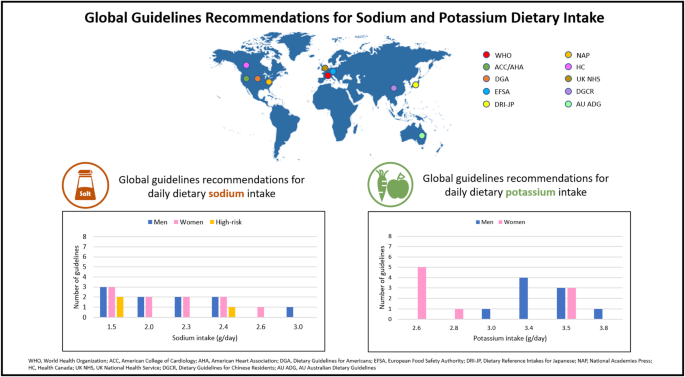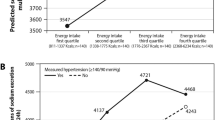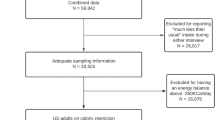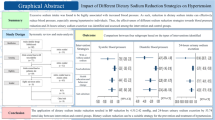Abstract
Non-communicable diseases (NCDs) cause a significant global health challenge, with unhealthy diets identified as a major risk factor. Sodium and potassium, which are essential minerals for human health, play important roles in various bodily functions, and an imbalance in their intake can have significant health implications, particularly concerning hypertension and cardiovascular diseases. This review compiles dietary sodium and potassium intake recommendations from prominent global health organizations and compares global guidelines to Japan’s Dietary Reference Intake (DRI) guidelines. Sodium and potassium intake guidelines from organizations such as the World Health Organization (WHO), American College of Cardiology (ACC) and American Heart Association (AHA), Dietary Guidelines for Americans (DGA), European Food Safety Authority (EFSA), and DRI for Japanese exhibit variations. Compared to other Asian countries, Japan’s historically higher sodium goal aligns with Southeast Asia where traditional preserved foods contribute to high sodium intake. Contrarily, Japan’s lower potassium goal contrasts with other countries in Asia promoting a diet rich in fruits and vegetables. The ongoing effort by Japan to align with global recommendations reflects a gradation approach considering social habits. While harmonizing international efforts is essential, appreciating regional diversities is paramount through tailoring guidelines to cultural and dietary habit practices. Implementing context-specific guidelines informed by scientific research can contribute to global efforts in promoting healthy diets and reducing the burden of NCDs.

Global guidelines that recommended the daily dietary intake goal for sodium and potassium exhibit variations. These disparities are influenced by diverse factors, including cultural dietary habits, socioeconomic status, health priorities, and available scientific research. Each population should follow the recommendations of their region.
This is a preview of subscription content, access via your institution
Access options
Subscribe to this journal
Receive 12 print issues and online access
$259.00 per year
only $21.58 per issue
Buy this article
- Purchase on Springer Link
- Instant access to full article PDF
Prices may be subject to local taxes which are calculated during checkout
Similar content being viewed by others
References
GBD 2017 Diet Collaborators. Health effects of dietary risks in 195 countries, 1990–2017: a systematic analysis for the Global Burden of Disease Study 2017. Lancet. 2019;393:1958–72.
Jomova K, Makova M, Alomar SY, Alwasel SH, Nepovimova E, Kuca K, et al. Essential metals in health and disease. Chem Biol Interact. 2022;367:110173.
He FJ, MacGregor GA. A comprehensive review on salt and health and current experience of worldwide salt reduction programmes. J Hum Hypertens. 2009;23:363–84.
Adrogué HJ, Madias NE. Sodium and potassium in the pathogenesis of hypertension. N Engl J Med. 2007;356:1966–78.
Whelton PK. Sodium, potassium, blood pressure, and cardiovascular disease in humans. Curr Hypertens Rep. 2014;16:465.
Grillo A, Salvi L, Coruzzi P, Salvi P, Parati G. Sodium intake and hypertension. Nutrients. 2019;11:1970.
Aburto NJ, Ziolkovska A, Hooper L, Elliott P, Cappuccio FP, Meerpohl JJ. Effect of lower sodium intake on health: systematic review and meta-analyses. BMJ. 2013;346:f1326.
Weaver CM. Potassium and health. Adv Nutr. 2013;4:368S–77S.
Aburto NJ, Hanson S, Gutierrez H, Hooper L, Elliott P, Cappuccio FP. Effect of increased potassium intake on cardiovascular risk factors and disease: systematic review and meta-analyses. BMJ. 2013;346:f1378.
Guideline: sodium intake for adults and children. Geneva: World Health Organization; 2012.
Reduce sodium intake and help manage your blood pressure. The American Heart Association recommends limiting daily sodium consumption to 1,500 mg or less in a new call for action for 2011. Heart Advis. 2011;14:9.
Whelton PK, Appel LJ, Sacco RL, Anderson CA, Antman EM, Campbell N, et al. Sodium, blood pressure, and cardiovascular disease: further evidence supporting the American Heart Association sodium reduction recommendations. Circulation. 2012;126:2880–9.
DiNicolantonio JJ, Niazi AK, Lavie CJ, O’Keefe JH. Problems with the American Heart Association Presidential Advisory advocating sodium restriction. Am J Hypertens. 2013;26:1201–4.
Arnett DK, Blumenthal RS, Albert MA, Buroker AB, Goldberger ZD, Hahn EJ, et al. 2019 ACC/AHA guideline on the primary prevention of cardiovascular disease: executive summary: a report of the American College of Cardiology/American Heart Association Task Force on Clinical Practice Guidelines. Circulation. 2019;140:e563–95.
How much sodium should I eat per day? Written by American Heart Association editorial staff and reviewed by science and medicine advisors. 2021. https://www.heart.org/en/healthy-living/healthy-eating/eat-smart/sodium/how-much-sodium-should-i-eat-per-day.
U.S. Department of Agriculture and U.S. Department of Health and Human Services. Dietary Guidelines for Americans, 2020–2025. 9th Edition. December 2020. Available at DietaryGuidelines.gov.
EFSA NDA Panel (EFSA Panel on Nutrition, Novel Foods and Food Allergens), Turck D, Castenmiller J, de Henauw S, Hirsch-Ernst K-I, Kearney J, et al. Scientific Opinion on the dietary reference values for sodium. EFSA J. 2019;17:5778.
Ministry of Health, Labor and Welfare of Japan. Dietary Reference Intakes for Japanese; 2020. (Japanese version).
Umemura S, Arima H, Arima S, Asayama K, Dohi Y, Hirooka Y, et al. The Japanese Society of Hypertension guidelines for the management of hypertension (JSH 2019). Hypertens Res. 2019;42:1235–481.
National Academies of Sciences, Engineering, and Medicine. Dietary reference intakes for sodium and potassium. Washington, DC: The National Academies Press; 2019.
Dietary reference intakes for elements. Government of Canada. 2023. https://www.canada.ca/en/health-canada/services/food-nutrition/healthy-eating/dietary-reference-intakes/tables/reference-values-elements-dietary-reference-intakes-tables-2005.html.
Health A to Z. Other (vitamins and minerals). NHS. 2020. https://www.nhs.uk/conditions/vitamins-and-minerals/others/.
Wang SS, Lay S, Yu HN, Shen SR. Dietary guidelines for Chinese residents (2016): comments and comparisons. J Zhejiang Univ Sci B. 2016;17:649–56.
National Health and Medical Research Council (2013) Australian Dietary Guidelines. Canberra: National Health and Medical Research Council.
McDonough AA, Youn JH. Potassium homeostasis: the knowns, the unknowns, and the health benefits. Physiology. 2017;32:100–11.
Guideline: potassium intake for adults and children. Geneva: World Health Organization; 2012.
How potassium can help control high blood pressure. Written by American Heart Association editorial staff and reviewed by science and medicine advisors. 2023. https://www.heart.org/en/health-topics/high-blood-pressure/changes-you-can-make-to-manage-high-blood-pressure/how-potassium-can-help-control-high-blood-pressure.
EFSA NDA Panel (EFSA Panel on Dietetic Products, Nutrition and Allergies), Turck D, Bresson J-L, Burlingame B, Dean T, Fairweather-Tait S, et al. Scientific opinion on dietary reference values for potassium. EFSA J. 2016;14:4592.
National Health and Medical Research Council, Australian Government Department of Health and Ageing, New Zealand Ministry of Health. Nutrient reference values for Australia and New Zealand. Canberra: National Health and Medical Research Council; 2006.
Amarra MS, Khor GL. Sodium consumption in Southeast Asia: an updated review of intake levels and dietary sources in six countries. In: Bendich A, Deckelbaum RJ, editors. Preventive nutrition. Switzerland: Springer International Publishing; 2015. p. 765–91.
Okuda N, Okayama A, Miura K, et al. Food sources of dietary potassium in the adult Japanese population: The International Study of Macro-/Micronutrients and Blood Pressure (INTERMAP). Nutrients. 2020;12:787.
Author information
Authors and Affiliations
Contributions
All authors participated in the critical revision of the manuscript. All authors approved the final version of the manuscript for submission.
Corresponding author
Ethics declarations
Conflict of interest
The first author ES is an employee of OMRON Healthcare Co., Ltd.
Additional information
Publisher’s note Springer Nature remains neutral with regard to jurisdictional claims in published maps and institutional affiliations.
Rights and permissions
Springer Nature or its licensor (e.g. a society or other partner) holds exclusive rights to this article under a publishing agreement with the author(s) or other rightsholder(s); author self-archiving of the accepted manuscript version of this article is solely governed by the terms of such publishing agreement and applicable law.
About this article
Cite this article
Salman, E., Kadota, A. & Miura, K. Global guidelines recommendations for dietary sodium and potassium intake. Hypertens Res (2024). https://doi.org/10.1038/s41440-024-01663-1
Received:
Revised:
Accepted:
Published:
DOI: https://doi.org/10.1038/s41440-024-01663-1



